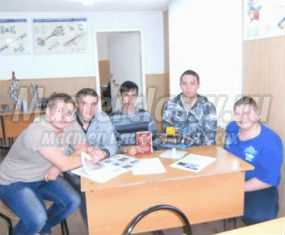Статья по английскому языку «Воспитание внимательности учеников»
Education of attentiveness
of pupils
One of the major psychological problems in
system of continuous education is a problem of education of level of
attentiveness of pupils.
It is known that reading of popular
scientific and educational literature occupies the lion's share of time in
independent work of pupils. Researches of psychologists and sociologists with
all evidence testify that for a number
of professions and specialties successful activity is possible at incomplete
attention (from 20% to 40%), conscious and critical reading, active hearing and
at the same time thinking is possible only at full attention. It directs us at
important practical conclusions in the organization of training and independent
work of pupils: about need of the correct alternation of types of mental work
for lesson schedule; about creation of optimum conditions in the reading rooms
and offices preventing occurrence of premature exhaustion.
By numerous psychology and pedagogical
researches it is proved that the system
of training and education is directed on formation of the comprehensive and
harmoniously developed personality, it has to get a response from itself, cause
desire to be improved, aspiration to attentiveness and self-development. It
should be noted that the unity of processes of education of attentiveness and
self-education is carried out only by interaction of the tutor (the teacher,
the teacher, the mentor) and the pupil in the course of educational and work.
From this before scientists and experts teachers there is a task of further
improvement of psychology and pedagogical techniques of education of
attentiveness and self-education of the identity of the pupils. However,
without purposeful and constant efforts of the teacher, attentiveness to the
school student doesn't come. It needs to be developed at each lesson. And for
this purpose it is necessary to get acquainted at least in general with essence
and attention mechanisms.
Attentiveness is a property of mental
identity of the person. It is characterized by degree of formation of the
skills connected with work of attention. Skills of concentration , distribution
and switching of attention belong to their number.
Under identical conditions of education the
level of attentiveness of different pupils isn't identical. It is explained,
first of all, by features of their temperament. If for the pupil mobility and
at the same time steadiness of psychological processes (sanguine temperament),
attentiveness easier are characteristic to develop at it. If it differs in
hypererethism, unbalance of psychological processes, impulsiveness of behavior (choleric
and melancholic temperaments), development of attentiveness demands much bigger
efforts as from the teacher, and the pupil. Inertness of psychological
processes (phlegmatic person’s temperament) also interferes with education of
some lines of attentiveness (in particular, abilities to fast switching of
attention).
And still the main thing in this case is
the general regularities of education of attentiveness which are shown in all
cases irrespective of features of temperament of this or that pupil. These
regularities are caused by essence of the most mental process called by
attention. In what does it consist?
The concept of attention is a peculiar
characteristic of work of our consciousness. (Therefore, by the way, in many
cases these two terms are used as interchangeable.) We emphasize with the
characteristic not of the content of consciousness, namely its work, its
dynamics.
The awake person constantly realizes
something. But in each this time point his consciousness (attention) is directed
only on one any object, say, on contents of the readable book or the listened
lecture, on the considered mechanism, on considering of the plan of the
forthcoming work, on tracking the course of the carried-out operation, etc. If
the object of attention is out of the person then speak about external
attention. If object are own thoughts, images, feelings of the person, it is
about internal attention.
Distribution and switching of external
attention are the most important mechanisms of regulation of activity in many
professions. However they play especially important role in work of the
operator (for example, the driver).
As for internal attention (characteristic,
in particular, for activity of the designer, the scientist, the writer, in
general for profound thinking), its dynamics also consists of the acts of
distribution and switching replacing each other. A difference only that all
this is directed on internal objects – thoughts, images, feelings.
Observation is an important component of
attentiveness, one of its effective tools. Besides the attention and
attentiveness don't exist in isolation from other mental processes and
properties. They can function and prove only in interaction with perception,
memory, imagination, thinking. The leader directing a role in this interaction
is played, of course, by thinking. Material for its work (as well as for work
of attention) provides memory. Therefore, and education of attentiveness of
pupils in many respects has to consist in the organization and rationalization
of their memory.
It is possible to note that the
carelessness of the beginner is considerably caused by not formation of his
movement skills. Is the formation of skills the main way to attentiveness
education?
Undoubtedly, these two processes are
interconnected: formation and
functioning of movement skills is impossible without a certain level of
attentiveness of pupils and education of this quality can happen in the course
of use of movement skills. That's why the main problem of education of
attentiveness as regulatory, so, and fundamental mental property has to be
leading. Besides this task has narrower and purposeful character and if to
concentrate on it special efforts, the foundation of its decision can be laid
in rather short time. What specific actions can be recommended for achievement
of this purpose?
As a starting
point of attentiveness is armament of an approximate basis of activity,
including algorithms of switching and distribution of attention in these or
those standard conditions of its course and it is necessary to direct prime
efforts on the solution of this task.
I organized the
pedagogical research directed on studying of level of attentiveness of pupils
of 5-9 classes. Were applied to this purpose, the questionnaire questionnaire,
connected by six qualities of attentiveness. The choice of these qualities was
defined, first, by the analysis of psychology and pedagogical literature and,
secondly; convenience of application of such technique in educational process.
Results allows
to draw a conclusion that work on education of level of attentiveness of pupils
should be sped up not in teenage, and at earlier age. It turned out, in our
opinion, rather paradoxical situation: in initial classes at school students
various personal qualities, including attentiveness start being formed and
improved, and later at the majority of them these qualities start being
deformed.
This fact is
extremely disturbing therefore serious scientific work is necessary for its
overcoming together with psychologists, experts teachers on the organization of
efficiency of education of level of attentiveness of younger generation.
Автор: Силютина Екатерина
Игоревна-учитель английского языка МБОУ СШ №8 г. Ярцево Смоленской области
Автор: Силютина Екатерина Игоревна
Добавить комментарий | Комментариев к новости "Статья по английскому языку «Воспитание внимательности учеников»" уже 0:













